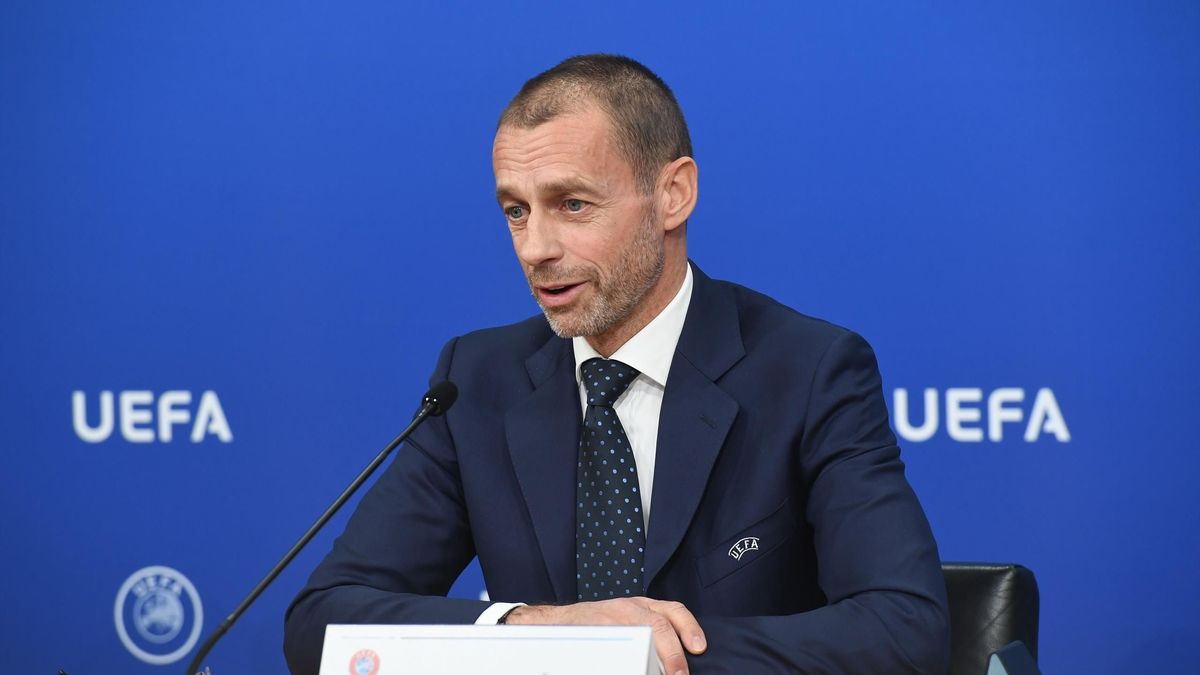The fever of holdings in European football starts to slow down. The shock wave that the practice reached in all countries and divisions during and after the pandemic “slowed down considerably,” according to the report. UEFA in its latest report on the finances of the clubs of the Old Continent.
The purchase and sale of clubs in the first divisions It fell by half in 2023, going from 47 operations to 23 operations in just one year.
The figure is even lower than that of 2020 (26), which suggests a downward trend for the coming years. UEFA sees different reasons in these figures: “it may reflect a change in investor confidence; could indicate a reassessment of the risks associated with owning a football club; or it may simply be due to a smaller number of clubs available for purchase after the pent-up demand during the pandemic.”
uefa ceferin.jpg
UEFA, the body chaired by Aleksander Ceferin, approved a budget of 5,096 million for the 2024-2025 season.
It is worth remembering that In 2022, the sales record was broken with 35 operations in elite clubs in 21 countries. But, not only operations slow down, but also investor preferences. The UEFA report reveals how the Second and Third Divisions played a leading role in the purchase and sale of clubs. The reason is simple: the appreciation potential and a lower startup investment. In this sense, the European football regulator highlights that in the Big-5 (Premier, LaLiga, Bundesliga, Serie A and Ligue-1) There were only three changes of hands, and only the Majorca It currently remains in the First Division. And not even anyone new joined, since the transfer of powers was from Robert Sarver to his partner Andy Kohlberg.
The other two teams are Leeds United and Sampdoria, that declined, and whose sales are directly related: Andrea Radrizzani transferred the club to his minority partner, the NFL 49ers, and took over Samp, which required a significant injection of capital to stay alive.
It is no coincidence that both Majorca as in Leeds American investors were involved. The capital of the North American giant once again flooded European football with money in 2023. Seven of the 15 club purchase operations by foreign funds had a Yankee accent; and, in fact, Uefa emphasizes that, for the first time, more operations were closed by foreign than national investment (8).
Reasons
Among the reasons that have led to this slowdown, the report recalls the importance that the availability of low-cost debt acquisition during the pandemic had during the pandemic. That scenario of low interest rates for a long period of time “played a fundamental role in attracting new investors to the football industry,” highlights Uefa.
Furthermore, insists the body chaired by Aleksander Eferin, “the financial losses suffered by many of the owners caused a significant number of clubs to be put up for sale.” Now it remains to be seen whether this is a change in dynamics in investment in football clubs or “simply a temporary adjustment to changing circumstances.”
The uncertain macroeconomic scenario “directly affects certain types of investors, in particular, investment funds and financial investors,” recalls the report, two profiles that have led the large purchases after the pandemic (Chelsea, Milan…). And linked to this, also the UEFA refers to the decrease in attractive clubs available. “There is a lack of good proposals at affordable prices,” she points out. And he adds: “The starting prices set by the owners discourage many buyers.”
That is why, perhaps, we are no longer seeing large purchases, there have been significant sales operations of minority stakes in recent months, such as the sale of 12.5% of the Paris Saint-Germain (PSG) to the North American fund Arctos Partners, or the entry of Jim Ratcliffe (owner of Ineos) as a shareholder of the Manchester United.
In this sense, the UEFA It also highlights that the trend of listed clubs leaving the Stock Market continues. In the United Kingdom alone, eight clubs have emerged in the last 20 years. “The current investment cycle can trigger new stock market exits,” notes the regulator.
Thirsty Holdings
Despite the scenario drawn, the holding companies are still thirsty for clubs. There are currently 105 European First Division clubs (13% of the total) that share an investor with another club. And in 2023, 31 operations involving a majority shareholding were closed (same figure as 2022) linked to a timeshare group. What is the change? The division. The UEFA He saw how more and more Second and Third Division teams are being sought, where they see “more affordable investment opportunities with well-identified advantages, particularly through promotion potential.” In total, counting all categories, there are 264 clubs that are part of holding companies.
Another trend mentioned by UEFA is the increase in minority investments in clubs. “What was once considered a less attractive investment proposition is gaining popularity. Some investors acquire minority stakes as a strategic measure to overcome high valuations and uncertain market conditions,” the regulator notes.
The UEFA It also deals with the profile of timeshare ownership in its report. 58% of the holding companies control two clubs; 18% between four and five clubs; 16%, three clubs; and 8%, more than five clubs around the world. Up to 65 groups of this type originate from the capital of the United States. In Spain there are eight multi-owners, of which four are in the First Division.
Among same holding
One of the lines in which the relationships between clubs of the same holding are most evident are the transfers of footballers. In 2023, 202 player movements were made between teams in the same multi-club network, 28% more than last year. Of this figure, 153 were in transfer format (76%), due to the 48 players who were transferred between them. “Multi-club investments could directly affect the short-term competitive level of some clubs, as some could be used as player development platforms without a clear ambition to improve long-term sporting results,” points out the UEFA.
In addition, the regulator explains that “the increase in multi-club investment groups could distort the transfer market” and slips that the sales and resale operations of players between the clubs of the same holding “could be considered a way of circumventing the restrictions imposed by “FIFA to international loans, although there is no evidence that this has occurred.”
Source: Ambito
I am Pierce Boyd, a driven and ambitious professional working in the news industry. I have been writing for 24 Hours Worlds for over five years, specializing in sports section coverage. During my tenure at the publication, I have built an impressive portfolio of articles that has earned me a reputation as an experienced journalist and content creator.




